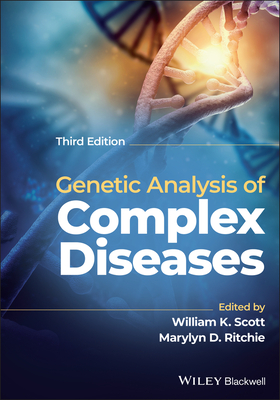商品描述
This book provides an overview of statistical concepts and basic methodology for the study of genetics of human traits and diseases. It attempts to provide a step-by-step description of problem identification, study design, methodology of data collection, data exploration, data summarization and visualization, and more advanced analytical methods for inferring genetic underpinnings of human phenotypes. The book provides codes in R programming language for implementation of most of the statistical methods described, which will enable practitioners to perform analysis of data on their own, without having to mold the data to fit the requirements of commercial statistical packages. Useful to anyone engaged in studies to understand and manage good health, the book is a useful guide for sustainable development of humankind. Primarily intended for practicing biologists especially those who carry out quantitative biological research, in particular, human geneticists, the book is also helpful in classroom teaching.
商品描述(中文翻譯)
本書提供了有關人類特徵和疾病遺傳學的統計概念和基本方法論的概述。它試圖逐步描述問題識別、研究設計、數據收集方法、數據探索、數據總結和可視化,以及推斷人類表型遺傳基礎的更高級分析方法。本書提供了使用 R 程式語言實現大多數描述的統計方法的代碼,這將使從業者能夠自行進行數據分析,而無需將數據調整以符合商業統計軟體的要求。本書對於任何從事理解和管理良好健康研究的人都非常有用,是人類可持續發展的實用指南。本書主要針對從事定量生物研究的生物學家,特別是人類遺傳學家,同時也對課堂教學有所幫助。
作者簡介
He has been awarded the G.N. Ramachandran Gold Medal (2021) by the CSIR; Barclay Memorial Medal (2020) byThe Asiatic Society; Sir P.C. Ray Memorial Medal (2020) by the University of Calcutta; Golden Jubilee Commemoration Medal (2018) by the Indian National Science Academy; Centenary Medal of Excellence (2014) by the School of Tropical Medicine; TWAS Prize in Biology (2009) of The World Academy of Sciences, Trieste; G.D. Birla Award for Scientific Research (2002) by the K.K. Birla Foundation, New Delhi and Kolkata; the Om Prakash Bhasin Award in Biotechnology (2001) by the Om Prakash Bhasin Foundation, New Delhi; the Ranbaxy Research Award in Applied Medical Sciences (2000) by the Ranbaxy Science Foundation, New Delhi; and the New Millennium Science Medal (2000) by the Indian Science Congress Association and the Council for Scientific and Industrial Research (CSIR), the Government of India.
作者簡介(中文翻譯)
Indranil Mukhopadhyay 是印度加爾各答印度統計學研究所(Indian Statistical Institute, Kolkata, India)人類遺傳學單位的教授。他在加爾各答大學(University of Calcutta, Kolkata, India)獲得博士學位。擁有超過 50 篇發表於多個國內外知名期刊的研究論文,他的研究興趣包括多位點遺傳關聯研究(multi-loci genetic association study)、多個遺傳數據集的數據整合(data integration of several genetic datasets)、單細胞數據分析(single cell data analytics)和數學統計(mathematical statistics)。他在教授人類遺傳學的本科和研究生統計方法課程方面擁有相當的經驗,並指導在該領域工作的博士生。他擔任 ICAR-IASRI 研究諮詢委員會成員,以及國際生物統計學會(International Biometric Society)、印度人類遺傳學會(Indian Society of Human Genetics)、印度醫學統計學會(Indian Society for Medical Statistics)等組織的成員。
Partha Pratim Majumder 是印度西孟加拉邦卡利亞尼的國家生物醫學基因組學研究所(National Institute of Biomedical Genomics, Kalyani, West Bengal, India)的創始人。他目前是印度政府的國家科學主席(National Science Chair)。他同時在多個國家研究所擔任學術職位。他在人體基因組組織(Human Genome Organisation)、人類細胞圖譜(Human Cell Atlas)和國際共同疾病聯盟(International Common Disease Alliance)的管理委員會和執行委員會中任職。此前,他曾擔任國際遺傳流行病學學會(International Genetic Epidemiology Society)、印度人類遺傳學會、印度醫學統計學會、美國人類遺傳學會等組織的治理成員。他是所有印度科學院、國際統計學會(International Statistical Institute)和世界科學院(The World Academy of Sciences)的當選院士(Fellow)。他曾擔任印度科學院的院長。他的研究興趣包括遺傳流行病學(genetic epidemiology)、人類生物醫學基因組學(human biomedical genomics)、人類基因組多樣性與演化(human genome diversity and evolution)以及統計遺傳學(statistical genetics)。
他曾獲得 CSIR 的 G.N. Ramachandran 金獎(2021)、亞洲學會的 Barclay 紀念獎(2020)、加爾各答大學的 Sir P.C. Ray 紀念獎(2020)、印度國家科學院的金禧紀念獎(2018)、熱帶醫學學院的百年卓越獎(2014)、世界科學院的 TWAS 生物學獎(2009)、K.K. Birla 基金會的 G.D. Birla 科學研究獎(2002)、Om Prakash Bhasin 基金會的 Om Prakash Bhasin 生物技術獎(2001)、Ranbaxy 科學基金會的 Ranbaxy 應用醫學科學研究獎(2000)以及印度科學大會和印度科學與工業研究委員會(CSIR)頒發的新千年科學獎(2000)。


























